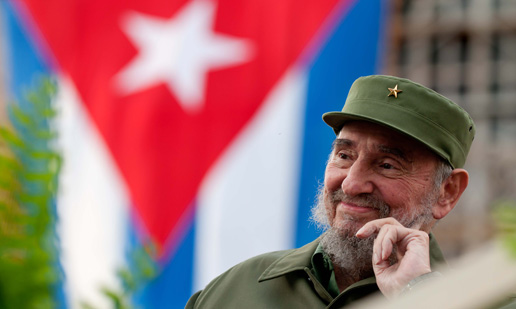
Who else alive today is more deserving than Fidel Castro of the honors he’ll receive for his 90th birthday on August 13? The revolution he guided has served the Cuban people and, beyond that, he’s been a protagonist of peace and justice for all peoples. There are millions of people throughout the world who hold up Fidel Castro as the protector of a small nation’s sovereignty under siege by a superpower. The nature of his enemies thus adds to his celebrity.
Fidel Castro exemplifies the idea of revolution and is a model for how to lead one. He is the preeminent symbol for revolutionary action.
Political revolutions with large-scale progressive aspirations are uncommon, those with social justice engrafted, like Cuba’s, even more so. On the short list are: maybe Britain’s incremental shedding of feudalism in the 17th century, Philadelphia in 1776, Paris in 1789, St. Petersburg in 1917, revolutionary China from the 1920s on, and the victory of Cuba’s revolution on January 1, 1959.
Revolutions calling for progressive political and social change stand for democracy, human dignity, and human survival. No one has headed one for as long and as effectively as Fidel Castro.
Revolutionary pragmatism
What, one asks, did he do to make his revolution work?
Fidel Castro learned from history and from ongoing realties. He discovered that oppression was rooted in systems programmed for the benefit of the wealthy and powerful and that change was in the hands of victims themselves, if they united. He placed himself in the stream of history, allying his political movement to that of José Martí who, decades earlier, had organized the “necessary” war for independence from both Spain and the United States and whose watchword was “With all and for the good of all.”
In pragmatic fashion, Castro and his governing colleagues learned from experience. They changed primary health care from small group practices to the family doctor/nurse system, launched the “rectification” campaign of the 1980s, abandoned of restrictions on gay people, invited religious believers to assume political roles, gave up backing for armed revolutionary struggle in the region, and sought practical means for overcoming the rigors of the “special period.”
Additionally, Fidel Castro fought his revolution with ideas, among them: bolstering political consciousness through the tools provided by the revolution like literacy and education for all; using health care and the biomedical industry to maintain health, advance international solidarity, and generate income for the nation; strengthening bonds between Cuba and Africa to accord with the African heritage of many Cubans; putting Simon Bolivar and José Martí’s ideal of Latin American and Caribbean integration into visible practice; and grafting the imperative of social justice onto the age-old banner of national liberation.
Two of Castro’s ideas, in particular, assure his pre-eminence among revolutionary leaders. In word and deed, Castro and his political movement added social and economic rights to the definition of democracy, previously confined mostly to political rights. And, Cuba’s revolution propounded the notion of world revolution through its practice of international solidarity and through its full-throated insistence that the world community face up to threats to human survival like climate change, wastage of the environment, and nuclear proliferation.
A leader and a teacher
As a revolutionary leader Fidel Castro was a teacher, a job which fit him well. His speeches to the Cuban people, in international forums, or in political assemblies, whether read or listened to, are replete with facts, data, and reasoning. They were presented conversationally, as if the readers or listeners were colleagues.
A teacher tells the truth. Fidel Castro often reported bad news, such as problems associated with the “special period” of the 1990s and corruption, which in a speech on November 17, 2005, he identified as a threat to the revolution’s survival. Commentators have frequently testified that Castro’s frankness led the Cuban people to believe what he said.
Fidel Castro demonstrated a power of analysis befitting the role of a good teacher. Doubters need only read Castro’s speech of November 23, 1963. There, a day after the event, Castro explored factors leading to the assassination of President John Kennedy.
Fidel Castro took the revolution and his job seriously. In a conversation, the present writer listened to a former member of the armed wing of South Africa’s African National Congress tell about a meeting Castro held with his comrades and himself. They were in Havana in 1978 attending the 11th World Festival of Youth and Students. Throughout much of the night, the story goes, Castro asked detailed questions of the South Africans about methods and realities of their struggle while proposing action plans and reviewing modes of Cuban support.
Indeed, for this author – true confessions here – Fidel Castro has served as a beacon of history since that day in 1957 when, as an undergraduate history student, he bought the latest edition of the New York Times. There, Herbert Matthews was reporting from the mountains of eastern Cuba after interviewing the guerrilla leader. The headline read: “Castro Is Still Alive and Still Fighting in Mountains.”
Astonishingly, it seemed that world-shaking events were taking place on a smallish island and not necessarily, as one assumed, in Europe or the United States. And the entry onto the stage of world history of a youthful lawyer was mind-bending. Vicariously at least, the student would be joining in on the leader’s long journey.
Photo: Fidel Castro participates in the celebration of the 50th anniversary of the Committees for the Defense of the Revolution (CDR) in Havana, September 28, 2010. | Roberto Chile / cubadebate.cu

MOST POPULAR TODAY

‘Warning! This product supports genocide’: Michigan group aims to educate consumers

After months of denial, U.S. admits to running Ukraine biolabs

“Trail of Tears Walk” commemorates Native Americans’ forced removal

Ohio: Franklin County treasurer attends Netanyahu meeting, steps up Israel Bond purchases

Hold the communism, please: SFMOMA’s Diego Rivera exhibit downplays artist’s radical politics



Comments